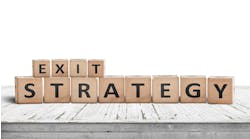Complicating matters was a perception on the part of insurance companies that the shop was difficult to work with. Darr explained that the business philosophy had been that "Triangle Auto Body should be compensated for all repair operations." And although that may seem like a reasonable request, many people in the collision industry understand that it doesn't exactly resonate with some insurance companies.
Glenn and Darr had known each other for 23 years. Darr previously worked for a large supplier to repair shops for 17 years and had been an industry consultant for three years. "In the summer of 2007, he gave me a call," Darr recalls. "Glenn knew my background and asked if I would take over the management responsibilities of his business."One of Darr's first actions was to assess where the company was competitively and where it needed to go, via what Darr calls a "whiteboard session" conducted with Glenn and one of the company's estimators and led by an outside facilitator. As Darr recalls, "We had to cut costs, increase production and increase market presence. It's hard to achieve one or another of those objectives; but to simultaneously accomplish all three is really hard."
When Darr took the lead, the business was down 20 percent. He focused on improving insurer relations by reorganizing the company and implementing a range of marketing strategies.As a result, the company finished the year with business down only 3 percent. They're still improving.
One fundamental change Darr concentrated on was the company's business mix. "In 2007, the business mix was 50 percent DRP, 15 percent non-DRP insurance work and 35 percent customer pay; which was far above the industry average," Darr says. "Long term, we knew it was a dangerous economic position to be in. Now our customer pay is down to about 10 percent of our portfolio." In 2008, the shop expanded its DRP portfolio from five to seven, and direct repair work has risen to 65 percent of the shop's business.
Triangle Auto Body also found a better way to gain business from customers insured by companies whose DRP programs the shop is not affiliated with. Those customers receive a copy of a brochure Darr created that includes information in question-and-answer form that verifies the car owners' rights to take go to the repair shop of their choice. With each answer, Triangle's brochure includes the portion of the state's anti-steering statute supporting the answer provided. Other questions include "Does the amount of damage covered by my policy change if I choose where my vehicle is repaired?" The answer: No.
Since the company began to aggressively promote consumer education with the help of the brochure, Darr says, "We went from closing 50 percent of our estimates to a close ratio of 87 percent." The net result has been that Triangle Auto Body's non-DRP insurance work increased to 35 percent.
The company's educational program attracted the attention of a local television station, providing an opportunity for Triangle to air a short segment focused on consumer awareness in selecting a quality repair shop. In addition to helping consumers, the segment, which aired during the evening news, brought Triangle Auto Body into the spotlight as a quality repair business.
Several other creative marketing techniques have helped boost Triangle's business. The company is now open for a half day on Saturdays for estimates and delivery of vehicles, making Triangle the only independent repair shop offering those services within its market.
Mobile estimates are another new service. "We offer mobile estimating and valet service for high-end vehicle owners within a 25-mile radius of Durham," notes Darr. "This has been a huge success, especially with Lexus owners. We share the transportation cost of this service with our rental car vendors to limit the associated cost."
Additionally, Darr found a way to leverage the shop's close proximity to Duke University. After being approved for the Duke University advertiser program, Triangle was listed as a preferred provider of repair services and offered Duke employees a discount of 10 percent. Darr explains, "An e-mail went out to 15,000 employees and gave us immediate exposure." The promotion was arranged through the university's human resources department, at no cost to Triangle. "You just fill out a form and they approve you," explains Darr, adding that the shop has a similar arrangement with the University of North Carolina at Chapel Hill.
One way to increase sales is to have others sell your services on your behalf — and Triangle has done that by implementing a referral rewards program through car dealers who recommend Triangle. Darr explains, "For each referral that turns into a repair order, the dealer gets a $200 credit that may be used by their sales or service departments." The program is effective and adds no marketing cost until the sale is actually realized.
Unlike most general managers, Darr does not have a production manager, parts manager or outside sales and marketing employees. Instead, he explains, "We have set up a team concept." Each of the shop's two estimators works closely with technicians and a paint team. "The estimators are paid to internally manage their own small body shop. They order parts, work with the insurance companies and serve customers. It's keys-to-keys for them. They see the car through." Darr likes this approach because it increases accountability and minimizes finger pointing.




